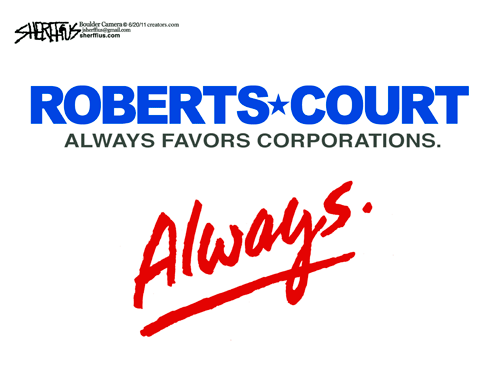This is a start. But will it even get off the ground considering that it might lead to the prosecution of the banksters that are the root cause of this recession.
U.S. Inquiry Is Said to Focus on S.&P. Ratings
By Louise Story
The Justice Department is investigating whether the nation’s largest credit ratings agency, Standard & Poor’s, improperly rated dozens of mortgage securities in the years leading up to the financial crisis, according to two people interviewed by the government and another briefed on such interviews.
The investigation began before Standard & Poor’s cut the United States’ AAA credit rating this month, but it is likely to add fuel to the political firestorm that has surrounded that action. Lawmakers and some administration officials have since questioned the agency’s secretive process, its credibility and the competence of its analysts, claiming to have found an error in its debt calculations.
In the mortgage inquiry, the Justice Department has been asking about instances in which the company’s analysts wanted to award lower ratings on mortgage bonds but may have been overruled by other S.& P. business managers, according to the people with knowledge of the interviews. If the government finds enough evidence to support such a case, which is likely to be a civil case, it could undercut S.& P.’s longstanding claim that its analysts act independently from business concerns.
At Rolling Stone, Matt Taibbi has a in depth article of how the SEC, itself, ending and covering up investigations into Wall St. and the banking industry, as well as, the destruction of the evidence, over the last to decades that contributed to the financial crisis:
For the past two decades, according to a whistle-blower at the SEC who recently came forward to Congress, the agency has been systematically destroying records of its preliminary investigations once they are closed. By whitewashing the files of some of the nation’s worst financial criminals, the SEC has kept an entire generation of federal investigators in the dark about past inquiries into insider trading, fraud and market manipulation against companies like Goldman Sachs, Deutsche Bank and AIG. With a few strokes of the keyboard, the evidence gathered during thousands of investigations – “18,000 … including Madoff,” as one high-ranking SEC official put it during a panicked meeting about the destruction – has apparently disappeared forever into the wormhole of history.
Under a deal the SEC worked out with the National Archives and Records Administration, all of the agency’s records – “including case files relating to preliminary investigations” – are supposed to be maintained for at least 25 years. But the SEC, using history-altering practices that for once actually deserve the overused and usually hysterical term “Orwellian,” devised an elaborate and possibly illegal system under which staffers were directed to dispose of the documents from any preliminary inquiry that did not receive approval from senior staff to become a full-blown, formal investigation. Amazingly, the wholesale destruction of the cases – known as MUIs, or “Matters Under Inquiry” – was not something done on the sly, in secret. The enforcement division of the SEC even spelled out the procedure in writing, on the commission’s internal website. “After you have closed a MUI that has not become an investigation,” the site advised staffers, “you should dispose of any documents obtained in connection with the MUI.”
Many of the destroyed files involved companies and individuals who would later play prominent roles in the economic meltdown of 2008. Two MUIs involving con artist Bernie Madoff vanished. So did a 2002 inquiry into financial fraud at Lehman Brothers, as well as a 2005 case of insider trading at the same soon-to-be-bankrupt bank. A 2009 preliminary investigation of insider trading by Goldman Sachs was deleted, along with records for at least three cases involving the infamous hedge fund SAC Capital.
The widespread destruction of records was brought to the attention of Congress in July, when an SEC attorney named Darcy Flynn decided to blow the whistle. According to Flynn, who was responsible for helping to manage the commission’s records, the SEC has been destroying records of preliminary investigations since at least 1993. After he alerted NARA to the problem, Flynn reports, senior staff at the SEC scrambled to hide the
The article is five fascinating pages that lays out the the revolving door of the SEC managers from the agency to the banks and Wall St. positions and back to the SEC as investigators. Another case of the felons in charge of the investigation of their own criminal activity.

 First they came for the guys and gals
First they came for the guys and gals The
The  Once again the corporate owned, conservative Supreme Court has
Once again the corporate owned, conservative Supreme Court has
Recent Comments